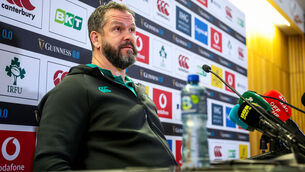How long before pro contracts can bridge the gap to England?

STAND OFF: Nichola Fryday of Ireland, Silvia Turani of Italy, Alex Matthews of England, Audrey Forlani of France, Hannah Jones of Wales and Scotland's Rachel Malcomat the launch of the 2023 TikTok Women's Six Nations in London. Picture: David Rogers/Getty Images
Hannah Jones was 25 years old with a sports therapy degree in the bag and pursuing a PE teacher training course at Cardiff Metropolitan University when her world turned on its axis early last year and a portal popped open into the promised land.
The Welsh centre had started playing rugby with a boys’ team 18 years earlier and stuck at it even as her mother had to drive longer and longer distances to reach the resources and opportunities she needed before making her Wales debut in 2015.












